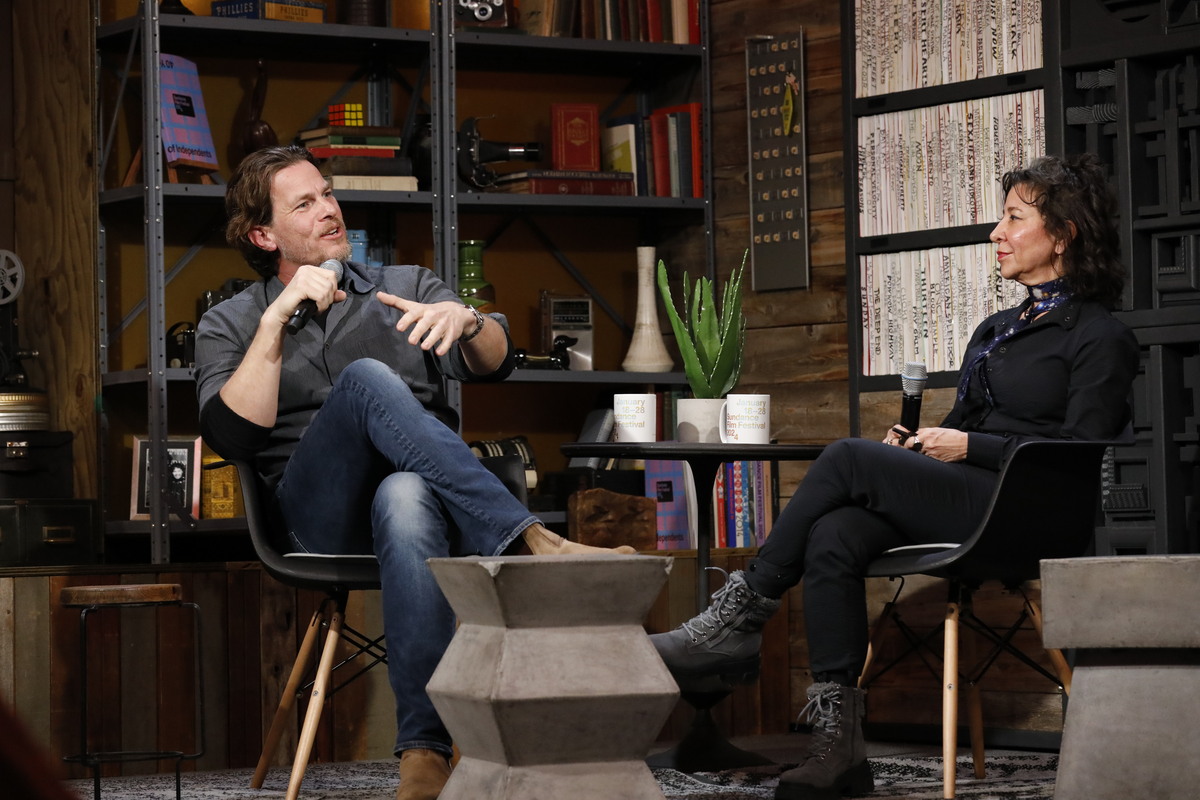PARK CITY, UTAH – JANUARY 23: Jonathan Nolan and Janna Levin at the Filmmaker Lodge in Park City, Utah, at the 2024 Sundance Film Festival. Photo courtesy of Sundance Institute. (Photo by Maya Dehlin)
By Stephanie Ornelas
“One of the most amazing things about looking at your work is you seem infused naturally with a genuine love of science. You’re that rare animal who also finds these dramatic narrative threads and extrapolations from those ideas.”
Janna Levin, astrophysics professor at Barnard College of Columbia University and the director of Sciences at Pioneer Works, kicked off a lively conversation at the Filmmaker Lodge with these words to producer and screenwriter Jonathan Nolan on January 23 at the 2024 Sundance Film Festival.
During the conversation, Nolan speaks with Levin and attendees about collaborating with his brother, Christopher Nolan, his personal opinions on AI, and where he draws inspiration for his projects. He also shares some fond — and hilarious — memories, like when he wrote the first version of Memento on an airplane vomit bag when he was 20.
Below are some highlights from the hour-long discussion:
On collaborating with brother Christopher Nolan on Memento (2001 Sundance Film
Festival):
“I was taking some time off school, trying to figure out what I wanted to study, and I just couldn’t shake this idea of someone who had been victimized and couldn’t remember being victimized,” Nolan recounts. “Revenge is the classic American theme. We love a good revenge story. But revenge stories, of course, are cautionary tales. This felt like an opportunity to take the classic revenge story, atomize it, break it into pieces, and try to pick up the pieces and glue it back together. We couldn’t figure out how to tell the story at first, because we needed it to reflect the protagonist’s condition. My solution was, I wanted to write it as a deck of cards and shuffle it so that every experience would be different.
“So we took a road trip, and I was driving, and I started explaining the idea to him, and he got very quiet. And he sees the same thing I do, which is inherently visual storytelling.”
On co-writing The Prestige with his brother:
“Our version of co-writing is [that] I usually do the first draft, he then makes a bunch of ill-advised changes and then changes them back,” laughs Nolan. “I got kind of obsessed with Tesla [the man], and while we were prepping the film, I drove across the country, and I got lost in Colorado Springs for a few months trying to dig out some of the artifacts left from Tesla’s time. Everything had been stolen and sold to collectors, which is just so perfect for the story. I’m not a conspiracy theorist, but if you look at what happened to Tesla, it does speak to how technology moves forward in fits and starts.”
On bringing The Dark Knight and The Dark Knight Rises to life:
“Batman was the only superhero that I was interested in as a kid because his superpower was money and rage. Chris had given me a copy of Batman when I was 14, and I was blown away by that book. The character is the technologist himself — he has to make all the powers himself with all the gizmos and gadgets.
“The interesting thing about these movies was that, while it was a beautiful filmmaking era, they had become very unpopular. Batman, weirdly, has always been on the spectrum of deeply serious or very much a parody itself,” he observes. “So we had to bounce back and forth. Are we taking this seriously? Are we not taking this seriously? For us, things were in such a dire state with the franchise. To adapt something that so many brilliant writers and artists have so thoroughly explored, you’re doing something that has been interpreted, reinterpreted, re-reinterpreted, so you’re free within the rough constraints of what we all can agree that Batman is.”
On AI, crypto, and technology:
“We’re getting to a point where technology is starting to challenge our ability. It’s equal parts horrifying and exciting,” Nolan muses. “It will be a real phenomenon. I’m torn between sort of a protectionist mindset, and I’m so excited to see what AI can do for us. So much of what we do as humans is digesting information, and the idea that these tools will be used to displace whole categories of workers, denying people an income, is a real problem as these technologies emerge,” he explains.
“I think the manipulation of social media and public sentiment right now by AI is going to be a disaster. I’m not afraid of Evan Rachel Wood as a robot. I’m afraid of humans misusing or being misled by these technologies.”







